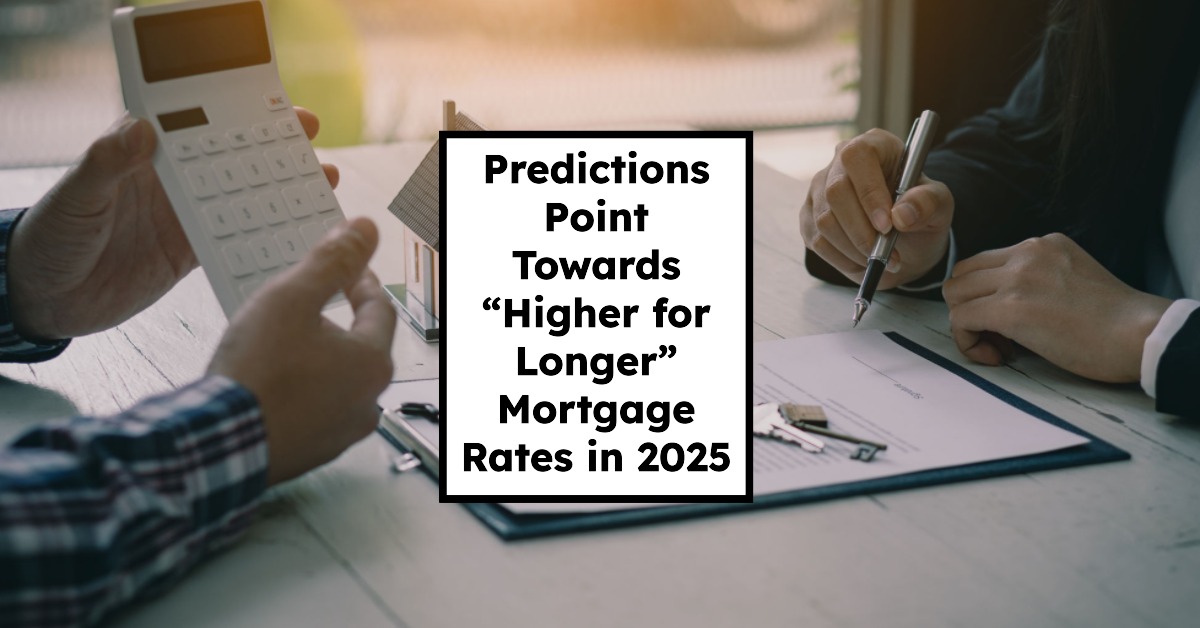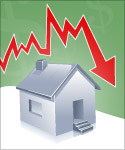As we navigate through 2025, economic experts predict that mortgage rates will remain higher for longer, with averages expected to hover between 5.75% and 7.25%. Though many anticipate gradual decreases, the current climate of persistent inflation and the Federal Reserve's monetary policy suggest that rates will not return to the historical lows experienced during the pandemic anytime soon. It’s important for prospective homebuyers and real estate investors to be aware of these trends as they make informed decisions in a volatile housing market.
Predictions Point Towards “Higher for Longer” Mortgage Rates in 2025
Key Takeaways
- Current Average Rates: As of January 2025, the average 30-year fixed mortgage rate is around 7%.
- Federal Reserve’s Influence: Federal Reserve actions may result in marginal rate reductions, but substantial declines are unlikely.
- Inflation Concerns: Ongoing inflation could further complicate any predictions of a significant drop in mortgage rates.
- Expert Predictions: Forecasts suggest rates will stay between 6% to 7.25% for most of the year.
- Market Implications: Buyers should prepare for a challenging housing market with limited inventory and high prices.
The Current State of Mortgage Rates
As of early 2025, the mortgage rates have settled at about 7% for a 30-year fixed loan. This marks a stark contrast to the 2-3% lows recorded during the pandemic. The rising rates can be attributed to several factors, including persistent inflation and the actions of the Federal Reserve aimed at stabilizing the economy. Despite the Fed's recent rate cuts, which are generally designed to spur economic growth, mortgage rates have remained stubbornly high due to underlying economic uncertainties. For immediate reference, the average rates according to recent data sources indicate:
| Mortgage Type | Average Rate |
|---|---|
| 30-Year Fixed | 7.27% |
| 15-Year Fixed | 6.47% |
| Jumbo Mortgage | 7.04% |
(For more details on current rates, refer to Bankrate.)
Key Factors Influencing Mortgage Rates in 2025
1. Federal Reserve Policy
The Federal Reserve’s monetary policy is pivotal in determining the trend of mortgage rates. Although the Fed does not set mortgage rates directly, its decisions on the federal funds rate have a substantial impact on the overall financial market, including the rates on Treasury securities, which closely influence mortgage rates. In 2024, the Fed enacted multiple rate cuts, but these did not lead to a significant reduction in mortgage rates due to ongoing economic concerns.
Economists like Lawrence Yun, Chief Economist at the National Association of Realtors (NAR), suggest that while more rate cuts are expected in 2025, the impact may not be as beneficial as many hope. He estimates six to eight rate cuts over the next two years, indicating a trend towards slight reductions but warns that rates are unlikely to fall back to the historic pandemic lows of around 3%. This reflects a broader sentiment among economists who foresee a cautious Fed, wary of inflationary pressures that still loom.
2. Inflation and Economic Growth
Inflation plays a substantial role in shaping mortgage rates. Although inflation has shown signs of cooling, hovering around 3%, it remains above the Fed's target rate of 2%. If inflation spikes due to economic pressures, such as increased spending or tariffs, the Fed might reconsider its approach to rate cuts. Conversely, if economic growth stalls, leading to higher unemployment, the Fed could initiate more aggressive rate cuts aimed at stabilizing the economy, potentially lowering mortgage rates.
However, the resilience of the American labor market complicates this scenario. As of now, job growth remains strong, making it less likely for the Fed to cut rates aggressively in the immediate future.
3. Geopolitical and Market Volatility
Global economic conditions and geopolitical events significantly impact mortgage rates. Issues such as conflicts, fluctuating oil prices, and trade tensions can place upward pressure on inflation and mortgage rates. As seen during the pandemic, crises can lead to volatile market reactions. For example, disruptions in oil supplies could lead to spikes in costs, pushing inflation even higher. Alternatively, significant geopolitical instability could drive investors toward the safety of U.S. Treasury bonds, potentially lowering rates.
Expert Predictions for 2025
Numerous financial institutions and economists have weighed in on the mortgage rate outlook for 2025, with predictions centering around the idea of sustained elevated rates. Here are some key forecasts from reputable sources:
- Fannie Mae estimates that mortgage rates will average 6.3% by the end of 2025.
- Mortgage Bankers Association (MBA) anticipates rates will range between 6.4% and 6.6%.
- HousingWire predicted in 2024 that 30-year fixed-rate mortgages will fluctuate between 5.75% and 7.25% throughout 2025.
These predictions reinforce the consensus that while there may be slight easing, significant reductions akin to pre-pandemic rates are unlikely to materialize soon. The overall expectation is that homebuyers should prepare for an environment characterized by higher-than-average rates.
Implications for Homebuyers and Sellers
The mortgage landscape in 2025 presents considerable challenges for both homebuyers and sellers.
1. Affordability Challenges
Rising mortgage rates, paired with ongoing high home prices, create notable affordability hurdles for many buyers. For instance, even a drop in rates to 6.5% might not sufficiently ease the financial burden when home prices remain elevated. This could limit options for first-time homebuyers who are particularly sensitive to even slight fluctuations in loan costs.
2. Refinancing Opportunities
For homeowners considering refinancing, the current environment offers a mixed bag of opportunities. Homeowners who secured low rates during the pandemic (sub-4%) are unlikely to benefit from refinancing unless rates drop significantly more into the mid-6% range. However, for those carrying higher-rate mortgages above 7%, refinancing could yield advantageous savings if rates were to dip moderately.
3. Market Activity
The combination of stabilized or slightly declining rates could incentivize some buyers to enter the market, spurring sales activity. Yet, ongoing challenges, such as constrained housing inventory and inflated prices, might stifle demand. Especially in popular or urban areas, market conditions will remain competitive.
Conclusion: A Year of Cautious Optimism
As we proceed through 2025, expectations suggest that mortgage rates will gradually move lower; however, they are projected to remain high in comparison to historical norms. Continual monitoring of economic indicators, Federal Reserve actions, and geopolitical dynamics will be essential for understanding future mortgage rate trends. As Lawrence Yun aptly puts it, “We expect rates to trend downward but remain elevated compared to the pre-pandemic levels.” Buyers and sellers alike must adjust their strategies in this uncertain market, relying on informed guidance to navigate the complex landscape.
Work with Norada in 2025, Your Trusted Source for
Turnkey Real Estate Investing
Discover high-quality, ready-to-rent properties designed to deliver consistent returns.
Contact us today to expand your real estate portfolio with confidence.
Contact our investment counselors (No Obligation):
(800) 611-3060
Read More:
- Rising Mortgage Rates: Can Porting Get You a Lower Interest Rate?
- Interest Rate Predictions for Next 2 Years: Expert Forecast
- Interest Rates Predictions for 5 Years: Where Are Rates Headed?
- Mortgage Rate Predictions for Next 5 Years
- Mortgage Rate Predictions for the Next 2 Years
- Mortgage Rate Predictions for Next 3 Years: Double Digit Rise
- Will Fed's Policy Crash the Housing Market Again?



